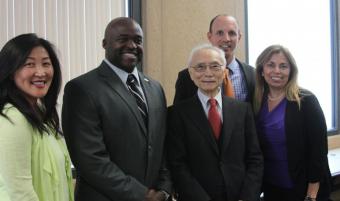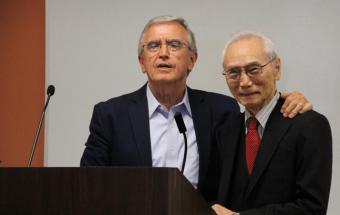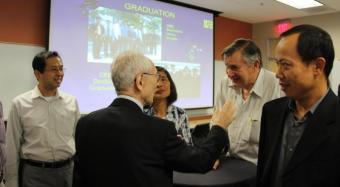Celebrating an Extraordinary Career
Masanobu Shinozuka retires
 A small crowd gathered recently to celebrate the long, illustrious career of UC Irvine Distinguished Professor Masanobu Shinozuka, who retired in May.
A small crowd gathered recently to celebrate the long, illustrious career of UC Irvine Distinguished Professor Masanobu Shinozuka, who retired in May.
A world-renowned expert in earthquake and structural engineering, Shinozuka joined the faculty at the UC Irvine Samueli School of Engineering in 2001. He served as chair of the Department of Civil and Environmental Engineering (CEE) for nine years. A member of the National Academy of Engineering since 1978, Shinozuka has contributed to the development of a national vision for engineering research, education and practice.
Shinozuka was born in Tokyo, Japan, in 1930. He earned his bachelor’s and master’s degrees in civil engineering from Kyoto University. In the late 50s, he traveled by ship to the United States, and then railroad to New York to attend Columbia University where he earned a doctorate. He went on to join the faculties, consecutively, of Columbia (27 years), Princeton University (seven years) and USC (seven years). In the early 90s, the NSF tapped Shinozuka to serve as director of its National Center for Earthquake Engineering Research in Buffalo, NY.
Professor Brett Sanders, the Samueli School’s current department chair of CEE, told the guests, “It has been an honor and privilege to have Professor Shinozuka as a colleague. He has had an incredible career. His work at UCI has increased the quality and productivity of research in the structures area.”
Dean Gregory Washington thanked Shinozuka for his contributions to the school and to the field. “We have lots of excellent faculty, but when a superstar like Professor Shinozuka retires, you can’t replace him. Not even two or three people can replace him.”
Faculty, staff and graduate students were on hand to wish Shinozuka well, and to share stories. Some engineering colleagues from USC made an  appearance as did former Samueli School Dean Nick Alexopolous, who said, “Shinozuka was one of the best hires I ever made. He was a game changer.”
appearance as did former Samueli School Dean Nick Alexopolous, who said, “Shinozuka was one of the best hires I ever made. He was a game changer.”
Professor Shinozuka took the podium and thanked everyone for coming. “This is an opportunity for me to give a thank you to everyone at UCI for the tremendous support, from the bottom of my heart. It has been so important to have an environment where I can sit quietly and do my research.”
He went on to acknowledge his former advisors and mentors at Kyoto University and Columbia, the growing group of former students who’ve gathered every 10 years for the past 30 years to celebrate his birthday, and the people working with him on his current research projects.
Shinozuka's research focuses on field theory and risk-assessment methodology in civil engineering. The applications for his work are in the areas of earthquake engineering in buildings, bridges, and lifeline and environmental systems. His work highlights the multidisciplinary aspects of infrastructure system problems. His most recent project has been to develop a novel monitoring and inspection system for large pipe networks in water and wastewater infrastructure systems using wireless sensor nodes incorporated in an advanced Supervisory Control and Data Acquisition (SCADA) system. Sponsored by the U.S. Department of Commerce’s National Institute of Standards and Technology (NIST), the project is a joint venture among UCI, two local engineering firms and three regional utility agencies.
“This has been important work,” said Shinozuka. “Now when we find a rupture, we can fix it using cyber technology. We experimented and verified it.”
“Professor Shinozuka is the embodiment of the gentleman scholar,” said Najmedin Meshkati, a USC engineering professor who attended the party. “The term ‘civil’ in civil engineering applies to him.”
Shinozuka concluded by saying he would miss working with students. “But you never know… I will do whatever I want to do.”
